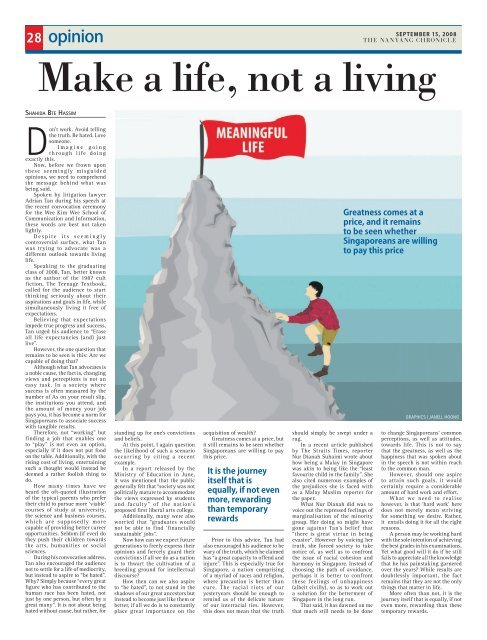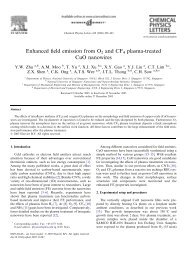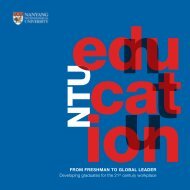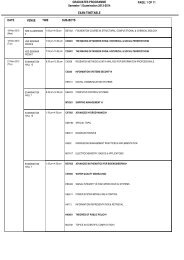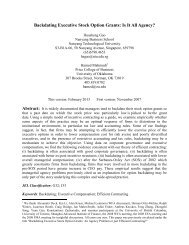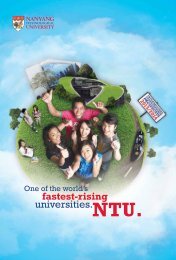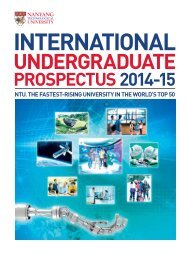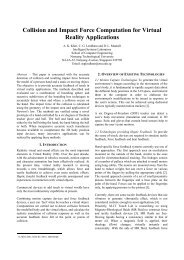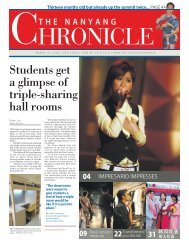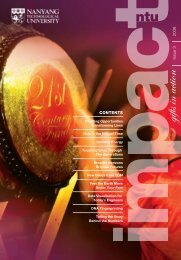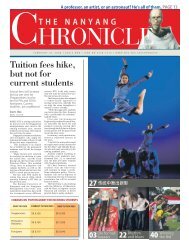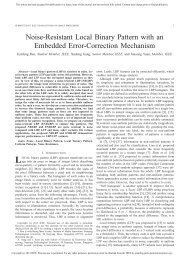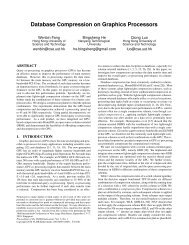Rock star welcome for Dr Kalam - Nanyang Technological University
Rock star welcome for Dr Kalam - Nanyang Technological University
Rock star welcome for Dr Kalam - Nanyang Technological University
You also want an ePaper? Increase the reach of your titles
YUMPU automatically turns print PDFs into web optimized ePapers that Google loves.
28opinionseptember 15, 2008The nanyang chronicleMake a life, not a livingSh a h i d a Bte HassimDon’t work. Avoid tellingthe truth. Be hated. Lovesomeone.Imagine goingthrough life doingexactly this.Now, be<strong>for</strong>e we frown uponthese seemingly misguidedopinions, we need to comprehendthe message behind what wasbeing said.Spoken by litigation lawyerAdrian Tan during his speech atthe recent convocation ceremony<strong>for</strong> the Wee Kim Wee School ofCommunication and In<strong>for</strong>mation,these words are best not takenlightly.Despite its seeminglycontroversial surface, what Tanwas trying to advocate was adifferent outlook towards livinglife.Speaking to the graduatingclass of 2008, Tan, better knownas the author of the 1987 cultfiction, The Teenage Textbook,called <strong>for</strong> the audience to <strong>star</strong>tthinking seriously about theiraspirations and goals in life, whilesimultaneously living it free ofexpectations.Believing that expectationsimpede true progress and success,Tan urged his audience to “Eraseall life expectancies (and) justlive”.However, the one question thatremains to be seen is this: Are wecapable of doing that?Although what Tan advocates isa noble cause, the fact is, changingviews and perceptions is not aneasy task. In a society wheresuccess is often measured by thenumber of As on your result slip,the institutions you attend, andthe amount of money your jobpays you, it has become a norm <strong>for</strong>Singaporeans to associate successwith tangible results.There<strong>for</strong>e, not “working” butfinding a job that enables oneto “play” is not even an option,especially if it does not put foodon the table. Additionally, with therising cost of living, entertainingsuch a thought would instead bedeemed a rather foolish thing todo.How many times have weheard the oft-quoted illustrationof the typical parents who prefertheir child to pursue more ‘viable’courses of study at university,the science and business courses,which are supposedly morecapable of providing better careeropportunities. Seldom (if ever) dothey push their children towardsthe arts, humanities or socialsciences.During his convocation address,Tan also encouraged the audiencenot to settle <strong>for</strong> a life of mediocrity,but instead to aspire to “be hated”.Why? Simply because “every greatfigure who has contributed to thehuman race has been hated, notjust by one person, but often by agreat many”. It is not about beinghated without cause, but rather, <strong>for</strong>standing up <strong>for</strong> one’s convictionsand beliefs.At this point, I again questionthe likelihood of such a scenariooccurring by citing a recentexample.In a report released by theMinistry of Education in June,it was mentioned that the publicgenerally felt that “society was notpolitically mature to accommodatethe views expressed by studentsand faculty” of the nation’sproposed first liberal arts college.Additionally, many were alsoworried that “graduates wouldnot be able to find ‘financiallysustainable’ jobs”.Now how can we expect futuregenerations to freely express theiropinions and fiercely guard theirconvictions if all we do as a nationis to thwart the cultivation of abreeding ground <strong>for</strong> intellectualdiscourse?How then can we also aspireto “be hated”, to not stand in theshadows of our great ancestors butinstead to become just like them orbetter, if all we do is to constantlyplace great importance on theacquisition of wealth?Greatness comes at a price, butit still remains to be seen whetherSingaporeans are willing to paythis price.It is the journeyitself that isequally, if not evenmore, rewardingthan temporaryrewardsPrior to this advice, Tan hadalso encouraged his audience to bewary of the truth, which he claimedhas “a great capacity to offend andinjure”. This is especially true <strong>for</strong>Singapore, a nation comprisingof a myriad of races and religion,where precaution is better thancure. The racial riots of ouryesteryears should be enough toremind us of the delicate natureof our interracial ties. However,this does not mean that the truthshould simply be swept under arug.In a recent article publishedby The Straits Times, reporterNur Dianah Suhaimi wrote abouthow being a Malay in Singaporewas akin to being like the “leastfavourite child in the family”. Shealso cited numerous examples ofthe prejudices she is faced withas a Malay Muslim reporter <strong>for</strong>the paper.What Nur Dianah did was tovoice out the repressed feelings ofmarginalisation of the minoritygroup. Her doing so might havegone against Tan’s belief that“there is great virtue in beingevasive”. However by voicing hertruth, she <strong>for</strong>ced society to takenotice of, as well as to confrontthe issue of racial cohesion andharmony in Singapore. Instead ofchoosing the path of avoidance,perhaps it is better to confrontthese feelings of unhappiness(albeit civilly), so as to work outa solution <strong>for</strong> the betterment ofSingapore in the long run.That said, it has dawned on methat much still needs to be doneGreatness comes at aprice, and it remainsto be seen whetherSingaporeans are willingto pay this priceGRAPHICS | JANELL HOONGto change Singaporeans’ commonperceptions, as well as attitudes,towards life. This is not to saythat the greatness, as well as thehappiness that was spoken aboutin the speech is not within reachto the common man.However, should one aspireto attain such goals, it wouldcertainly require a considerableamount of hard work and ef<strong>for</strong>t.What we need to realisehowever, is that ‘hard work’ heredoes not merely mean striving<strong>for</strong> something we desire. Rather,it entails doing it <strong>for</strong> all the rightreasons.A person may be working hardwith the sole intention of achievingthe best grades in his examinations.Yet what good will it do if he stillfails to appreciate all the knowledgethat he has painstaking garneredover the years? While results aredoubtlessly important, the factremains that they are not the onlythings that matter in life.More often than not, it is thejourney itself that is equally, if noteven more, rewarding than thesetemporary rewards.


